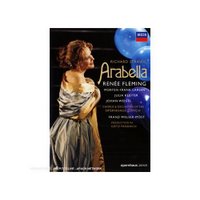Rosenkavalier in Paris - February 4, 2009
Assembled for three staged performances and a HD video recording while opening the Winter season in Baden-Baden, the troupe travelled to Paris' Théâtre des Champs-Elysées for a single concert version on February 4, witnessed by this writer, with a final concert performance in Munich a few days later. In Baden-Baden, one of the rich legacy of productions from the late producer Herbert Werneke, seen in Paris and Salzburg, was re-staged for the occasion.
Fleming, while her trademark golden tones were in plentiful supply, never seemed to occupy the role of the princess facing painful transitions and the arch of Strauss' musical line was only hinted at. The French mezzo Sophie Koch's Octavian, however, was detailed and opulent and her portrait of the young knight was full of blossoming life. The Second Act duet between Octavian and Sophie, sung radiantly by no less than soprano Diana Damrau, was, for many, the highlight of the evening. There were special discoveries in the secondary roles. Soprano Irmgard Vislmaier as the maid, Marianne, made surprising impact even next to Damrau. The rich baritone of veteran, Franz Grundheber, now over 70, made Faninal sound ageless but still could not erase my memories of Derek Hammond-Stroud's definitive rendering of this role.
The baritone Franz Hawlata sings his Lerchenau-lite so often he probably gets mail in the Baron's name. His lower register lacks warmth or weight when needed - which is rather often in this role - and fails to satisfy, however intelligent the delivery. The Italian Singer, in keeping with the "galactic" level, was no less than Ramon Vargas whose aria was delivered with such easy Italianate elegance that only Luciano Pavarotti could rank above it in my memory. As Annina, star mezzo Jane Henschel was clearly having fun as was her Valzacci, tenor Wolfgang Ablinger-Sperrhake. The Philharmonia Chorus of Vienna helped out as did, in the final scene, The Children's Chorus of the Helmholtz School in Karlsruhe.
Near the top of most "favorite orchestra" lists, the Munich Philharmonic was, this night, a master ensemble with a singleness of purpose, rich sound and the sensitive interaction characteristic of the great orchestras. Playing with ardor and technical brilliance, you could even hear a touch of classic Viennese Schlamperei. This word, which is best translated as "sloppiness" describes the loose, familiar playing of a typical Viennese orchestra. It could even have been a soupçon too much during the mighty sounds of the "Presentation of the Rose." Otherwise, the passion between conductor, orchestra and singers, all carefully balanced, in bringing this score to life was always vivid in the hall. Christian Thielemann, now just 50, is regarded as a leading Strauss interpreter and the sheer musicality he can draw from the orchestra makes any appearance in your city an event not to be missed. It is easy to imagine audience members holding on to the memory of this evening for years to come.
- Frank Cadenhead
Labels: Christian Thielemann, opera, Renée Fleming





